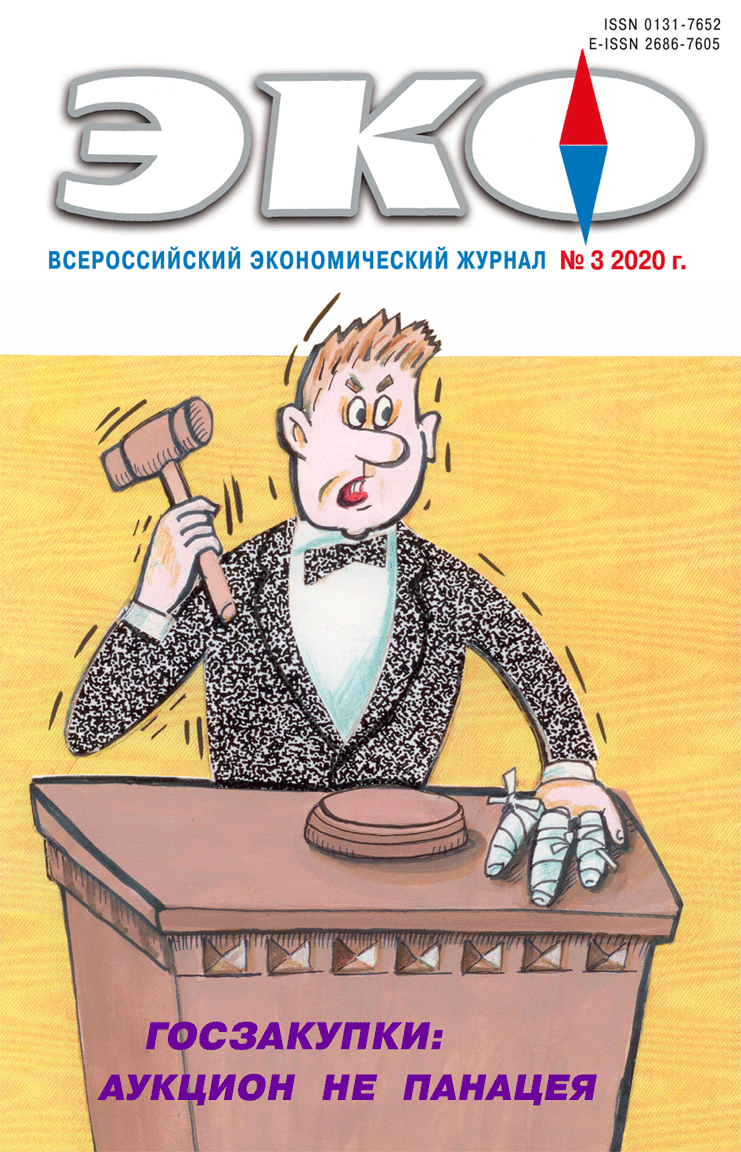Тема номера: Госзакупки: аукцион не панацея
Published 2020-02-28
Keywords
- healthcare,
- human capital,
- institutional trap,
- public procurement,
- negative effects
- medicine supply,
- 44-FZ,
- contract system,
- import replacement ...More
How to Cite
1.
Valieva О. Institutional Traps in Russian Нealthcare System. ECO [Internet]. 2020 Feb. 28 [cited 2025 Apr. 25];50(3):44-60. Available from: https://ecotrends.ru/index.php/eco/article/view/3986
Abstract
The paper shows how negative consequences of institutional support of healthcare adversely affect its efficiency. The incidence of deaths is growing while medicine supply is deteriorating. The author analyses negative effects generated by one of the most serious barriers, namely the institutional trap in the Russian healthcare. Close consideration is given to the current legislation in the field of public procurement. Theoretical approaches help clarify consequences of decisions taken to curb financing and tighten administrative barriers in the market of medical services as well as stimulate import replacement at the pharmaceutical market. The author comes to conclusion that all decisions made in the last years aggravate problems of the national healthcare system, lead to its further degradation and reduce its economic and social efficiency.References
- Индексы и индикаторы человеческого развития: Обновленные статистические данные 2018. ООН [Эл. ресурс] // URL: http://hdr.undp.org/sites/default/files/2018_human_development_statistical_update_ru.pdf (дата обращения: 02.02.2020).
- Мусина Н. З., Федяева В. К. Методы расчета QALY как интегрального показателя эффективности в процессе комплексной оценки лекарственных препаратов // Фармакоэкономика. Cовременная фармакоэкономика и фармакоэпидемиология. 2017. 10(1). С. 66–71.
- Полтерович В. М. Элементы теории реформ / В. М. Полтерович. М.: Экономика, 2007.
- Полтерович В. М. Институциональные ловушки и экономические реформы // Экономика и математические методы. 1999. Т. 35. Вып. 2. С. 3–20 [Эл. ресурс] // URL: http://mathecon.cemi.rssi.ru/vm_polterovich/files/ep99001.pdf (дата обращения: 02.02.2020).
- Российское здравоохранение в новых экономических условиях: вызовы и перспективы [Текст]: Доклад НИУ ВШЭ по проблемам развития системы здравоохранения / рук. авт. колл. С. В. Шишкин; Нац. исслед. ун-т «Высшая школа экономики». М.: Изд. дом Высшей школы экономики, 2017.
- Сонин К. И. Когда кончится нефть и другие уроки экономики. М.: АСТ: CORPUS, 2019.
- Тагаева Т. О., Казанцева Л. К. Общественное здоровье и здравоохранение в России // ЭКО. 2017. № 2. С. 63–81. DOI: http://dx.doi.org/10.30680/ECO0131–7652–2017–2–36–81
- Ягудина Р. И., Куликов А. Ю., Литвиненко М. М. QALY: история, методология и будущее метода // Фармакоэкономика. Cовременная фармакоэкономика и фармакоэпидемиология. 2010. Т. 3. № 1. С. 7–11.
- Human Development Report 2019. Beyond income, beyond averages, beyond today: Inequalities in human development in the 21st century. (2019). United Nations Development Programme (UNDP). Available at: http://hdr.undp.org/sites/default/files/hdr2019.pdf (accessed 02.02.2020).
- Whitehead, S.J, Ali, S. (2010). Health outcomes in economic evaluation: the QALY and utilities. British Medical Bulletin, Vol. 96, Issue 1, December, Pp. 5–21. Available at: https://doi.org/10.1093/bmb/ldq033

